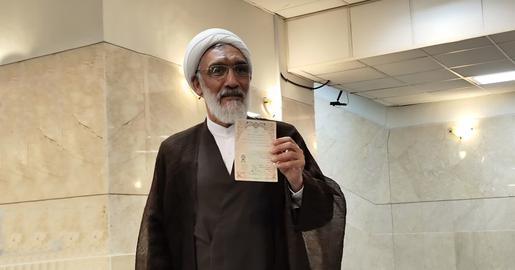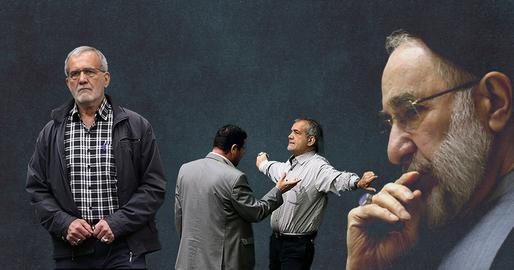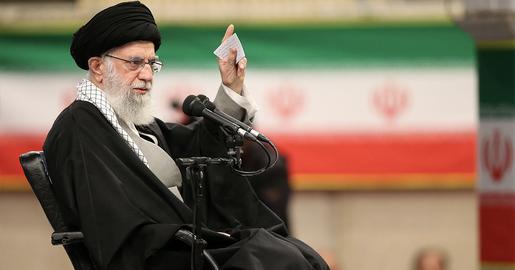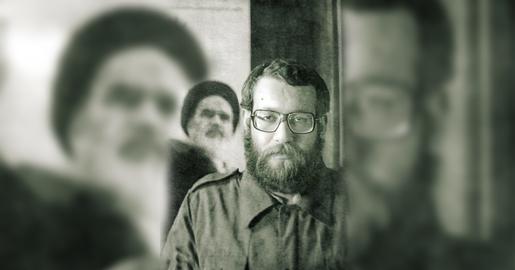Iran's next presidential election is set for June 28, amid the peak of summer heat.
This early election, mandated by the constitution, aims to have a new president in office within 50 days following the death of the former president.
On Sunday, President Ebrahim Raisi and his entourage tragically died in a helicopter crash.
As per the Islamic Republic's leadership structure, First Vice President Mohammad Mokhber has assumed the role of acting president.
However, the constitution requires a formal election for a permanent leader.
While the upcoming election adheres to the constitutional timeline, potential legal hurdles remain.
The process is dependent on the formation of key governing bodies, including the parliament, the government itself, and the Guardian Council, which supervises candidate qualifications.
How many years will the next presidential term be?
This question was the first to preoccupy many people.
According to Article 1 of the Presidential Election Law, the term is four years, identical to that of regular elections.
However, ambiguity surrounds the simultaneity of presidential and parliamentary elections.
Historically, to avoid annual elections in Iran, it was decided that elections for the parliament and the Assembly of Experts would be held simultaneously.
Article 22 of the Presidential Elections Law states: "Presidential elections and the elections of the city and village council will be held at the same time, and the Ministry of Interior is obliged to provide the necessary preparations for the elections of the councils."
Due to the early presidential elections, which must be conducted in a special manner and within the next fifty days, it is usually not possible to hold both presidential and parliamentary elections simultaneously.
The note in Article 22 outlines the procedure for this situation: "If the presidential term ends before four years due to the causes mentioned in Article 131 of the Constitution, the parliament, in order to synchronize the elections of the city and village councils with the presidential elections, will decide by suspending or extending the term of the parliament within the framework of the constitution."
Given the time constraints and the high cost of holding council elections, it is logical that the current term of the councils should be extended until 2027.
However, a major issue is that the parliament is currently in a transitional period.
During this time, Parliament representatives do not have the right to vote due to the non-approval of their credentials.
To address this problem, the speaker of the parliament will likely recall the representatives of the previous parliament to hold an extraordinary meeting in the next day or two.
This must occur before the official end of the 11th parliament, where they will present a three-urgent plan to announce their opinion.
Legal procedure for holding presidential elections
The legal procedure for holding presidential elections remains largely unchanged from the usual procedure, despite the existing challenge that must be resolved by the Parliament and the Guardian Council in the coming days.
According to the law on presidential elections, the following actions must be carried out within a specified period of 50 days.
- Determining the Executive and Supervisory Committees of the Elections within the next seven days.
- According to Article 31 of the Presidential Election Law, the government must, within the next seven days, appoint an election executive board consisting of The Minister of Interior (chairman of the board), a member of the Parliament Speaker's Board elected, the Attorney General of the country, the Minister of Intelligence, and seven public trustees from religious, political, cultural, and societal sectors.
There are two important considerations:
- Selection from the Parliament:
Since the twelfth parliament is on the verge of formation and its speaker has not yet been determined, the only viable option is to elect one person from the Parliament Speaker's Board based on the maximum and minimum age requirements stipulated by law for representatives.
- Executive Committee Composition:
Considering the time constraints, it is likely that the Minister of the Interior will select the seven individuals who were part of the executive committee for the outgoing parliament elections, as their work has not yet been fully completed.
These individuals have already received the approval of the Guardian Council, which allows for quick re-approval.
However, none of the members of the executive board for the outgoing parliament elections or their close relatives can be candidates for the presidential elections.
Naturally, since the approval of the members of the election executive committee falls under the jurisdiction of the election supervision committee, the Guardian Council must appoint the supervision committee for the upcoming presidential elections and publish their names within the next day or two.
Announcing the beginning of election and start of registration of candidates
After the formation of the executive board, the election process begins.
According to Article 55 of the Presidential Election Law, candidates have five days to register and announce their candidacy.
This typically occurs in mid-June.
Reviewing the qualifications of the candidates and announcing the results is the next step.
The executive board will announce the report on five days of candidate registration to the Guardian Council.
The Guardian Council has five days to announce its opinion on the qualifications of the candidates.
Although the Guardian Council can delay the announcement of the results of the qualification determination for up to five days, due to the time limit, this will probably not happen.
Announcing names of candidates and starting election campaigns
After the Guardian Council determines the qualifications of the candidates, the Ministry of Interior has two days to announce the final list of election candidates.
From the time the names are announced, the candidates have the opportunity to campaign until 24 hours before the start of voting.
As a rule, the final names of the candidates will be announced.
If none of the candidates secure 50 per cent of the votes in the first round, the two candidates with the highest number of votes will proceed to a second round, which will be held a month later.
Can Hassan Rouhani be a candidate for the presidential election again?
One of the hot debates of the next few days revolves around the potential candidates for the upcoming elections, including the legal possibility of Hassan Rouhani, the former president of Iran, running again.
According to Article 114 of the Constitution, the president cannot be elected for more than two consecutive terms.
This means that after serving eight years as president, an individual cannot be elected for a third consecutive term.
However, the individual is allowed to run again after a four-year break.
The presidential election law is unclear about whether a person who has served as president for eight years is only barred from running for one election period or a full four-year term.
This ambiguity suggests that Hassan Rouhani is not legally prohibited from announcing his candidacy.
If he runs and is elected, his presidency would not be considered a third consecutive term.
Financial cost of early presidential elections
This is another challenge that the heads of state and the first vice president, as the guarantor of the presidency, must address.
The annual budget law typically provides a budget for holding elections.
Specifically, the Ministry of Interior and the Guardian Council each have designated budget lines for election expenses.
However, the budget for 2024 included only a small allocation for the second phase of the parliamentary elections.
To fund early presidential elections, a bill must be submitted to amend the budget law in parliament and allocate a new budget.
The problem is that currently, there is no parliament to approve such a bill.
The new parliament will convene on May 27, but until the representatives' credentials are approved, they do not have the legal right to legislate.
Therefore, it appears that the heads of forces and the first vice president will decide and implement their decision after securing approval from the supreme leader.


























comments